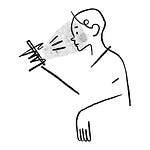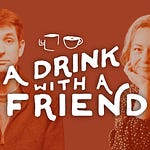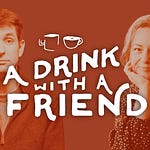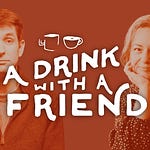After some tragic news a few weeks ago about a friend of Seth’s, he and Tsh unpack what it means to live in our current reality of isolation. So many people are lonely, hurting, or have lost their way, and the best and truest solution is community. Community is the conduit for hope. No one needs to be alone. Let’s fight for hope because it’s literal life or death for some of us. There is genuine sacramental beauty in reaching out to other people.
Seth: Newsletter | Twitter | Instagram | Website
Tsh: Newsletter | Twitter | Instagram | Website
Support the show — buy the next round of drinks!
Subscribe to the show’s Substack
Tsh’s Rule of Life workshop
Family Furnishings, by Alice Munro
Rest, by Alex Soojung-Kim Pang
Suicide Hotline — 1-800-273-8255
Scroll down for the transcript.
Give your mom the most meaningful gift this Mother’s Day with StoryWorth. Go to StoryWorth.com/drink to get $10 off your first purchase!
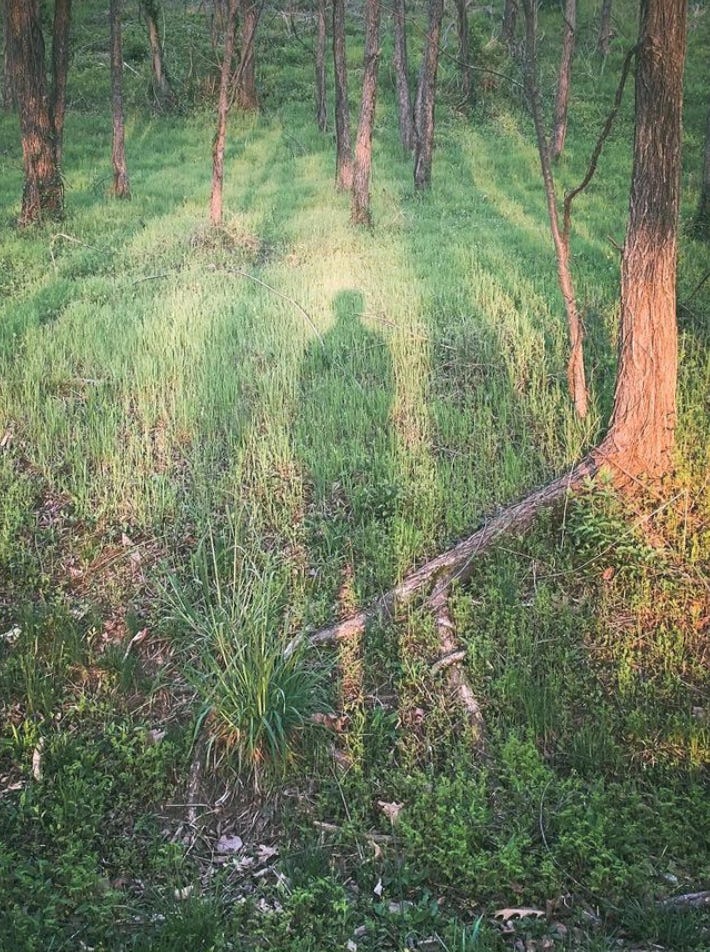
Tsh: This is A Drink With a Friend, I’m Tsh Oxenreider.
Seth: And I’m Seth Haines.
Tsh: Seth, what are you drinking?
Seth: I’ve been trying various things for nutrition and I just finished this meal replacement, actually it’s as a meal supplement. It has all your daily greens and antioxidants, and protein and all that stuff. I just finished it and to be honest, it tasted a little bit like death. Like chocolate death but still like death. I was going to drink coffee this afternoon but I decided I wanted to wash that taste out of my mouth a little bit with something that was a little bit more berry-ish so I am drinking what has come to be a staple on the show, the Spindrift sparkling water, this is the raspberry-lime version. I specifically got it to wash the taste out of my mouth.
Tsh: Chocolate death sounds gross. Any drink with the word death in it.
Seth: I’m a huge chocolate lover. Amber says there are two types of people. Lemon people and chocolate people. I am team chocolate. I’m excited when I see something that is healthy and chocolate except I haven’t learned my lesson yet that most things that are healthy and chocolate taste like chocolate death.
Tsh: They are not good, which is sad.
Seth: It is sad. If any of the listeners have any ideas about things that we should eat/drink that are healthy and chocolate I will very much take them up on it.
Tsh: There you go.
Seth: Tsh, what are you drinking today?
Tsh: Speaking of repeats on the show, two minutes until we recorded, I was like, oh shoot, I should get a different drink. No, forget it. I’m drinking my concoction that I now need to come up with a name for because I drink this every afternoon. I think it was what I was drinking two weeks ago when I was on the show last. It is this weird apple cider vinegar plus lemon plus Himalayan sea salt plus sparking water concoction. It’s really good. I know it sounds gross but it’s not. I’m doing this thing that we will maybe one day talk about on the podcast about intermittent fasting and it’s good for electrolytes, to get your salt in when you’re not getting it in other ways and when you’re drinking a whole lot of water. That’s why I drink it every afternoon and I love it. That’s what I’m drinking, in a big ole mason jar.
Seth: You should call it DWAF for drink with a friend and you can just say, today I’m drinking DWAF.
Tsh: I like it. I can do that actually.
Seth: Which also sounds how a four year old would pronounce giraffe.
Tsh: That’s kind of cute. That’s our new logo.
Seth: There you go.
Tsh: Thank you for your lovely wife, Amber, holding down the fort last week. It was lovely to hear ya’lls voices. I submitted my book and I am human again so I appreciate it. We might just have her on again because I’d like to talk with her about all sorts of stuff.
Seth: She’s great. We should have her on and let me just exit the room and just let the two of ya’ll talk because that would be an amazing episode.
Tsh: I have all kinds of thoughts regarding chickens and farming because we’ve become these people and I think she’s a kindred spirit in that department.
Seth: 100%. I have zero thoughts about chickens other than we get to eat the eggs.
Tsh: Right. You guys have, speaking of Amber and you guys in your family, you’ve had a wild week, couple of weeks? A couple of weeks since Easter, right?
Seth: Yeah. It was right before Easter.
Tsh: You’ve talked about it on social media and I think in your writing so it’s not surprising to your readers but go ahead and share a little bit about what’s on your mind.
Seth: A couple of weeks ago, I had a friend, a good friend. We sorta lost touch over the last year which is part of the story, but a good friend who passed away, lost his life to suicide. It was a difficult, confusing two weeks, three weeks now. Very sad in a lot of ways. There have been bits and pieces of hope and grace and also grief and anger and all the mix of emotions that go along with losing someone who loses their life to suicide. It’s been a really hard couple of weeks.
Tsh: Is this ever something you’ve experienced before, in your own life?
Seth: No, it’s not. Growing up, you get to be our age, you know of occurrences of it, of people who have it happen from time to time. High school classmates or people who were in college the same time I was but as far as friends, no, this is my first experience with it and it’s a brutal experience.
Tsh: I bet. Same with me. I’ve known of high school classmates and college classmates but never first hand. My dad has and he will talk about with me some time and I hate to say it, I think it is one of these matter of time that most of us will experience this more directly at some point in our lives. It’s common.
Seth: Yeah. And it’s growing more and more common. To some degree, we can talk about the particulars today, to some degree, this is a little bit more of a meta-conversation. It’s a conversation that feels really timely. I’ve done a lot of speaking on addiction and depression and mental health issues and part of that grows out of my own battle with alcohol and when you start doing any sort of research on alcohol or addiction you start to look at issues of pain and existential pain and what drives addictive cycles and when you start researching existential pain you get into to things like depression and anxiety and these sorts of things. What we’ve seen since the pandemic, various things. One, we all know this, an increase in isolation. For months and months and months, many of us didn’t leave the house. If you’re in a situation where you’re not living with anyone or you don’t have people in your house, that isolation can be really brutal and it can be just as brutal if you live with family. We know that there’s increased isolation. With that increased isolation has come things like increased addiction to all sorts of different things. We know that opioid use has skyrocketed. We know that alcohol use is up. We know that porn use is up. My guess would be, binge shopping is up. My guess would be binge eating is up. Because in these cycles of pain, you turn to the thing that brings you comfort. Along with those things, all a sudden come these feelings of guilt and shame and depression and if there’s one thing any person in recovery will tell you, once that sets in, it’s a downward spiral. As a result of that, I did a little research and it was actually before all of this happened, over the last year at the beginning of the pandemic, they noticed that suicidal ideation really didn’t have that much of an uptick. They thought it was going to and it really didn’t. But when the second wave hit and isolation for the second time hit after the summer, we started seeing a 7% to 30%, depending on the region of the world, an increase in suicidal ideation and action. That was a 7 to 30% year over year, not just a pre-pandemic period but over the year of 2019. This is something that is on the rise. It’s increasing. I expect we’ll see a slow down in the summer. Even still, this is something that psychologists and psychiatrists have been tracking now for a few years. These deaths of despair. Despair that causes opioid overdose and death by suicide and all those different despairing moments in the world that culminate in death. These have been on the rise for several years. I think this is something that is worth talking about and worth talking about candidly.
Tsh: I think, in addition, the increased technology access that we have, the social media faux connectivity, I have heard there is a direct correlation between the rise in social media use and addiction and suicidal ideation, especially among teens because there’s this weird paradox where we’re more connected than ever which makes us more isolated than ever because it’s not a real connection. I think we all see this in…I’m a mom to a teen girl. This is very front and center in my mind. I’m a teacher, I hear this from other families that this is a real thing and it has nothing to do with how religious your family is, or how well-intentioned you are with certain parameters in your life when it comes to things that you would classify as bad or wrong. Whether it’s alcohol use or watching of certain things, or whatever. Basically, we’re all prey to it in our modern society with instant access to everything.
Seth: 100%. To me, the indicator of how alone we are is when I go to a park or when I’m running on a trail. This actually happened this weekend. I was out trail running and I saw two people walking on a trail in the middle of nowhere (it was in the middle of the city, but you get what I’m saying), we were on a trail. It was out in the woods. There were both staring at their phones. I thought, oh wow, not only are they together and staring out their phones, they’re together in the wilderness and staring at their phones. I do think there’s a correlation. It feels like a correlation. Every time I get on the internet, I feel a little less human. I feel sometimes a little more jealous. A little less connected. A little less platform. A little less, a little less, a little less. It would be hard for me to imagine that in a world where people need hope and encouragement and community and songs of joy that getting on a vacuous platform would somehow fill a need that we think we have and that need being community.
Tsh: You are the one, I think are the one that opened my eyes to that idea back when Coming Clean came out. This idea of, maybe you’re going to say it better than me, but the antithesis of addiction is not something, it’s community, can you tell what I’m getting at?
Seth: There are a couple of predicates. One is Johann Hair has written an amazing book and has done an amazing article and Ted Talk on this idea that the opposite of addiction is truly community. He says we need to stop fighting the war on drugs and sing more love songs. Less war songs, more love songs I think is how he puts it. He actually talks about how there were rats in the scientific study and they were put in this maze and at the end of the maze, there were these two water bottles. One had heroin in it and one did not. When they got to the end, the rats were in isolation, no other rats in the maze, as a reward they would pick this heroin water. In fact, even outside of the maze they would just keep hitting this heroin water over and over again. When the researchers put the rats in a rat playground with other rats and good community, they still offered them the heroin water and the regular water and the rats every time would pick the regular water. They didn’t want the heroin water anymore. They wanted to be present to the other rats. That’s predicate one. Predicate two is when you look at Ephesians, the book of Ephesians, because I’m a Christian, this is what I read. In the book of Ephesians, Paul writes not to be drunk on wine to be filled with the Holy Spirit. Then he goes on to say, sing to one another in psalms and spiritual songs, which is the weirdest passage that you would say don’t be drunk but instead go and hang out and sing to each other. That’s so bizarre. What I think he’s saying is, instead of being stuck in these loops of isolation and drunkenness and addiction, all of those things which most people do in isolation, go to the community. Be surrounded by a community who embraces you and brings you in and sings love songs and joy songs and hope songs over you. That this is functionally the fix to addiction. The truth is, that’s the truth. This is why people go to AA and NA and SA. This is why recovery programs take you in for a period of weeks work because it incorporates you into a community with a singular focus and that singular focus is hope and encouragement and love. I know we’re not 100% talking about addiction here but I think the principle is the same. My friend had been isolated. In fact, every person I know of secondhand who’s died by suicide has had a period of deep isolation. The research is showing that suicide is going up. Why? Because of isolation. One of the fixes that we know is, listen, don’t be filled with depression. Don’t be filled with anxiety. Yes, go to therapy. Do those things. But also, be involved in a community that loves you and cares about you, and knows who you are. It doesn’t have to be church. It doesn’t have to be a community group but it has to be a group of people who genuinely know you and care for you and hear you and see you.
Tsh: I think that’s exactly why we see the connection with teens increase in suicide in that demographic and increase in social media because they are searching for community. Most teens I know are very lonely. Very lonely. They don’t have the pre-frontal cortex yet to maturely seek out community or be the vulnerable one to say, hey, let’s be friends. It’s hard for us adults to do that. Not to keep bringing it back to that, but I think that’s why we see that demographic, and yet who are we if not, those of us that are adults that feel like we should know better, but we’re cut from the exact same fabric. I was listening to Dear Hank and John, it’s a podcast that the whole family listens to with Hank and John Green, they’re brothers. They pointed out this one interesting sociological phenomena, it was a rabbit trail because they were talking about why we nod to strangers when we walk by each other, why we do this weird head thing, where that comes from. They pointed out that if you think about it in the span of human history, it’s actually really rare that you spend your day among strangers. We go to Target and 99% of the people we don’t know and we actually find it strange when we run into somebody we do know or we see somebody out in the wild that we know, it feels jarring. Yet, that was not the case for all of human history, really. We lived in a very small little radius where we were in a village, we knew our neighbors, we knew everybody around us and it didn’t take us long to become this modern society where we go a mile away to the store and we don’t know anybody and we’re so used to that that we don’t even think that’s weird. To me, that spoke into how much our brains have shifted to this idea of what’s normal what’s not when maybe our souls have maybe not yet caught up or maybe shouldn’t catch up because that’s not what they were made for.
Seth: Or maybe we’ll never catch up. Fundamentally we were made a particular way. We were made as communal creatures. Again, I think the deaths of despair are an indication that we have fundamentally denied a part of our existence, which is that communal need, the primal need to be in community, in group, fully known, fully loved. Even if we’re ribbed every now and then or sarcastically gigged a little bit. We have a tribe, we have a people, we have a group. Whatever word you want to use. We need a community of people surrounding us that know us and that allow us to be fully known and for them to be fully known. This is the way humans have done it forever and this is how the best humans will operate and do operate now and in the future.
Tsh: Yeah.
[ad break]
Tsh: The past few weeks have been brand new territory for you and Amber. I’m curious if you have insight on how to be a friend in this regard. I’m just thinking, surely there’s at least one listener who has walked this path that you have walked. What have you been learning about how to go through this?
Seth: I think the first thing is recognizing that we all have shadow and light. A friend who passes this way is not innately bad. They’re not any worse than I am. There is this real tendency towards anger and this sense of betrayal and that’s natural and you ought to feel that and you ought to express that and it’s going to happen. Everyone I talked to said the same thing, I feel betrayed. I feel angry. But at the same time would then quickly pivot to say, I get it, and it doesn’t ruin my love for the human. In fact, Amber said, the fact that he loved you and you loved him is the greatest miracle. Ya’ll and your friends experienced something together and that was really beautiful. One, just recognizing that we’re all shadow and light. We’re all darkness from time to time. The truth is, maybe three or four series of events could take me to the same dark place or to a similar dark place. I think just recognizing that.
Tsh: I’ve also heard that those who struggle with suicide ideation, it’s easy for us to think that this is a selfish act when really they’re thinking is this is the most selfless thing that I can do so that I will no longer be a burden to those I love.
Seth: Totally. 100%. We can say that that’s false thinking but in a sense, in their experience, that is ultimately true. It doesn’t make it true objectively but in their subjective experience, it makes it true. Again, learning to have compassion on the deceased, even in death, having compassion. I think that’s a big one. The second thing is, trying to walk the line from friend to family in this is really tricky. Family needs space to grieve. Friends need space to grieve. Just saying once or twice, if you need anything, I am here. But also saying, but I don’t need to be here. You surround yourself with who you need, if I’m one of those people, let me know. If I fill a particular niche in your life, let me know. If I can help you straighten out some affairs or go run an errand or bring you a loaf of bread, whatever my role is, just let me know. At the memorial service, one of the family members indicated so many of you have reached out and said you want to help and I really appreciate that but there’s nothing you can do. For that person, in that moment, the continual asking for help was not helpful, it was actually painful.
Tsh: I’ve heard, too, this is my experience with depression, which I know isn’t the same thing but it definitely is of the same fabric, that whenever I had people say, how are you doing, do you need anything? It froze me because I didn’t know how to answer. Everything and nothing? I don’t know. Depending on the kind of relationship you have, I found it was helpful for certain people that knew me well enough and was in my life well enough to just say, hey, I’m swinging by the store, do you need anything from the store? What I mean is, get really practical or granular. Don’t just say, need anything? Maybe it just depends on the person.
Seth: I think that’s true. I think part of it if you are in a mentally healthy space and you’re helping someone who is going to be dealing with anguish at the loss of a loved one through suicide, particularly, then it’s just approaching it from a healthy angle. Not thinking that you are the solution to anything. Not centering yourself on the project or in the process or in the problem. Just saying, if you need anything, I am here. I think that’s supercritical that I learned, really by accident. It’s why I wanted to talk about it today because I posted a short deal on Instagram. You know how I don’t like to do words on Instagram. I don’t like to do word art, or whatever. I think I’ve done it twice in the last year or something for very discreet purposes. This was one of those purposes. I said the shadows are growing long, it has been a long pandemic season and if you find yourself looking at the shadows and saying this is too much, there’s a number you can call. There’s a hotline that you can call and somebody will talk to you on the other side of the phone. If you don’t have community, and we’ve been saying you need community to talk these things out, there’s someone you can call. I mentioned that and I think two people publicly, in the comments, indicated I get this. I have felt this. I think just seeing people want to show up on an Instagram page and say, I get this, was really shocking to me. Because two people that I really don’t know in a public forum of people that they don’t know saying, I understand how things can get this dark and in fact, I’ve been there lately, is an indication that this is a much bigger issue than we think. Certainly, there are people listening today who have felt that way in the past. Listen, I’ve felt that way before. I remember in Coming Clean, I write about this. I was sitting with my therapist and I said, I don’t think I want to take my life but I don’t want to be here anymore. I felt so crazy. He was like, nope, you’re not crazy. I hear that three or four times a week. This is super normal, you realize that, right? Where it’s abnormal is when you isolate yourself so much that you think that that’s the only way out. That’s when it goes too far and you’re here talking to me so let’s talk that through. It was so helpful. My biggest takeaway is that this is a much bigger deal than we think. If you found yourself in this place, you’re not crazy. You haven’t lost your mind. You’re not any darker than most other humans. You may feel lonely. What do you do about that? Call someone. Call the suicide hotline. Call a therapist. Call a friend and just say I’m struggling with this and I don’t want to do it. The truth is, and I’ll say this objectively, as a friend, not subjectively, I know it feels like things would be better if only you weren’t there. I know this for a fact from another situation I helped with as an attorney, I know you might think like the insurance money is going to be better for my family than my life but what I will tell you is, that’s bull-shit, that’s not true. If there is any kind of ideation like that running around in your head, you’ve got to pick up the phone and call. The fourth thing I would say is that this really does go to my faith, as a practitioner of the way of Jesus and the way of the Catholic Church, I really have a gift to be able to go and say I don’t know that I want to call the suicide prevention hotline, I don’t know that I want to tell my family, I don’t know that I want to tell a friend, but I can go and sit and talk to a priest. He has to talk to me. If I say, I want to go to confession, he can’t be like, nah, not today. He has to talk to me and that’s cool and pretty freaking awesome. If you are a liturgical person, if you’re a practitioner in the way of Jesus and the Catholic Church, use that as an option when things get dark. If you’re not, if you’re a random evangelical or Baptist or non-denominational or whatever you are and you can’t get an audience with someone on your staff, which normally you can, call your local priest. They will meet with you.
Tsh: I actually, a few years ago, learned that priests or diocese in the Catholic Church are set up to where priests are covering a neighborhood and not just the parishioners that come in and fill the pews. Their moral obligation per their vows is for a particular area. If you live in that area of that particular parish, he’s your priest even if you don’t think of it that way.
Seth: I sat with a friend who’s not Catholic and our priest about two months ago and he was walking through a particularly tricky situation and wanted some wisdom and some counsel and we called the priest and we went and sat down. It was incredible. The wisdom was spot on. Again, you do have people even if you feel like you don’t.
Tsh: To swing back to your point three, I think the stigma with therapy is waning which is great but I think there might still be somebody who might justify their lack of need because of either the cost or the hassle, or who are they to complain about their kids driving them crazy in a pandemic when there are much bigger issues in the world. I think we need to burn that lie to the ground because it’s very easy to justify not going to a therapist and I have never regretted going even if it was a therapist that didn’t work out because we didn’t click, which I think is important to realize, that sometimes it takes a couple of visits or a couple of months to find a therapist that works for you. Therapy has always been a net positive in my life and you’re very, very normal to go see a therapist.
Seth: 100%. Totally normal. I was thinking yesterday, in part because of this, it’s probably time for a tune-up. I might need to go in. We firmly believe in therapy in the Haines household.
Tsh: Yeah, we do too. There are so many options now that there’s a lot of online therapists. I’ve not personally done that but I’ve heard a lot of people who have and that’s a good partial solution. If you don’t feel like you can connect with somebody local, even though it’s not ideal to talk through a screen, that is better than nothing. Definitely go that route.
Seth: To sum up my thoughts, here we talk a lot about what does it mean to look at the good, the true, and the beautiful. We’re actually doing that really as a shorthand, we’re saying what is the sacramental truth underlying life? Where do we experience God? A lot of what we’ve seen over the last year has been almost like a systematic deconstruction of the ways we experience God. Churches were shut down. Communities were shut down. People were experiencing community only through Zoom, if at all. It’s just been a dark year of isolation. But I think the sacramental truth is God created us to experience His goodness through the grace of community and we have to crawl out, climb out of the darkness of this pandemic, and fight for it. Because the alternative to fighting for it is giving up. Yesterday, and this is kind of a tangential point, I made this little joke on Instagram that only true fans of John Prine get which I posted a picture of Amber and I said, “She’s my lady, won’t say maybe. Never gonna let her go.” Some of you are now laughing because of the lines of that song. John Blase, a friend of mine said, he thinks that really the crux of it is holding on to one another. I think he’s really on to something. There’s not some deep, biblical truth hidden there. There’s no sermon or sellable content in don’t let go. I think Prine was on to something and functionally what he was saying is we were meant for each other, and not just husband and wife. We were meant for each other and when we let go, that’s when we lose hope. That’s when things fall apart. There’s something really important to fighting for, clawing, scratching for community, especially when the days are dark.
Tsh: To sum up, you were showing strength and not weakness when you reach out to somebody and you feel like an idiot and you say, hey, I’m not doing well or I’m lonely or can we talk, even if it feels awkward. Even if you feel like, gosh, we have to catch up, it’s been a long time since we’ve talked. It shows strength to reach out. Both of our takeaways is reach out to somebody and we will put in the show notes the number that you put on your Instagram post so that it’s there as a resource for people.
Seth: Don’t wait. Make the call.
Tsh: Well said. We like to talk about something we’re watching, listening to, or reading every week that is bringing more truth, beauty, or goodness in our life. What do you have right now, Seth?
Seth: I have had Alice Munro’s book, Family Furnishings. It’s her selected short stories which are really super long.
Tsh: They are very long and she can be wordy. I do like some of her stuff.
Seth: I was telling Amber yesterday, I’m slowly making my way through the first story. I was telling you that I’ve been having a hard time finishing fiction. I am not having a hard time with this one. I found myself lost in her wordplay and her character development in ways that like, oh, she’s telling me that man is an abuser. Or she’s telling me that that man is very tender or that woman is a homemaker. She never says the words. She just paints these amazing pictures that let you understand who that character is in the world and I told Amber last night, I kind of want to quit writing. It’s that good. I don’t know if I could ever pull that off.
Tsh: There are some writers like that where I get mad at sentences that are so good.
Seth: Yes. When I read Munro, there’s nothing in isolation that I feel like that was technically beyond my reach but it’s when she combines the whole thing together to make these really vague sentences paint a very clear picture, it’s transcendent. It’s beautiful work. I’ve really loved it. It has been sitting on my shelf for three, four, maybe five years. I just pulled it down because I was looking for some short stories.
Tsh: I’m glad you said that because I was going to mention that I have found that if I get in a reading rut, that short stories tend to get me out of it. Because it’s start to finish in one chapter, even if they’re long, it’s shorter than a novel.
Seth: Totally. Her first short story in that book is like fifty-something pages long. Which is hilarious. Anyone else would call that a novella, but whatever.
Tsh: Right.
Seth: Tsh, what are you on to right now that’s making your life more beautiful.
Tsh: I just started this book. I’m literally on chapter two, I can’t tell you much about how it’s going to end, it’s non-fiction. It’s called Rest. I got this, I submitted my book manuscript and then I can’t even remember how I heard this but I was like, this is for me. Buy right now. It’s by Alex Soojung-Kim Pang. I think it came out three years ago. You’re nodding. Have you read this?
Seth: Yes, it is so good. Actually, this is one of the books that convinced me that I needed to read more non-fiction. It’s so good.
Tsh: It’s really well-written so far. The subtitle is, Why You Get More Done When You Work Less, which I’ve always been a believer of but this book writing, this particular project chewed me up and spat me out and I don’t it has anything to do with the book itself. It had to do with the pandemic plus a million other things. It was just a slog to write. I didn’t sleep well, it was just a rough go. I think I’ve just been more and more aware lately of how essential sleep is, which I’ve long known but I don’t think I prioritized it until recently. I bought a Fitbit, which I always said I would not do but I did. My favorite thing about it so far is not the step counting, because I get 10K easily, it’s the sleeping. It tells you how well you’re sleeping and I sleep crappy. I knew that but it was still interesting to see. I am prioritizing it big time these days and this book is a companion to my sleeping journey here that I hope to benefit from soon.
Seth: When you’re finished with that book, we should talk about this book on the podcast because I think sleep is the most underrated thing. I need, need, need, need seven hours. I sleep maybe six.
Tsh: Yeah.
Seth: And it’s awful.
Tsh: If you asked me before this, I thought I would get about eight because I would go to bed on time and wake up. I was obeying all the rules they said to do but I was still not getting good, restful, deep sleep. This is why I’m tired. Or normal should not be tired. This is my new quest now that I’ve done my writing project. I’m going to work at getting better sleep.
Seth: The quest for rest.
Tsh: Yes, that’s right. I am 100% in favor of talking about this because I have a feeling that we’re not alone.
Seth: Everybody who listens should tell us, somewhere, comment somewhere, maybe on the Substack page and tell us if you want to hear about rest because I think, surely we’re not the only two.
Tsh: I’m sure we’re not seeing as this book was written to begin with.
Seth: Yes.
Tsh: Alright, it’s time to wrap this up. You can find this episode, as well as all episodes, at adrinkwithafriend.com. It’s also where you can sign up for our new Substack space for the show, where we have plans for some pretty great extra stuff for you, and it’s also where you can support this show for just a few bucks. If you like what we’re bringing to your earbuds, we are almost 100% listener-supported and we like it that way — so again, all this is at adrinkwithafriend.com and in the show notes of this episode. You can find me and all my work at tshoxenreider.com — Seth, where can people find you?
Seth: You can find me at sethhaines.com. Everything that you need to know about me is there.
Tsh: Music for the show is by Kevin MacLeod, editing is by Kyle Oxenreider, and Caroline TeSelle is our transcriber and assistant extraordinaire. I’m Tsh Oxenreider, and Seth and I will be back here with you soon. Thanks for listening.








